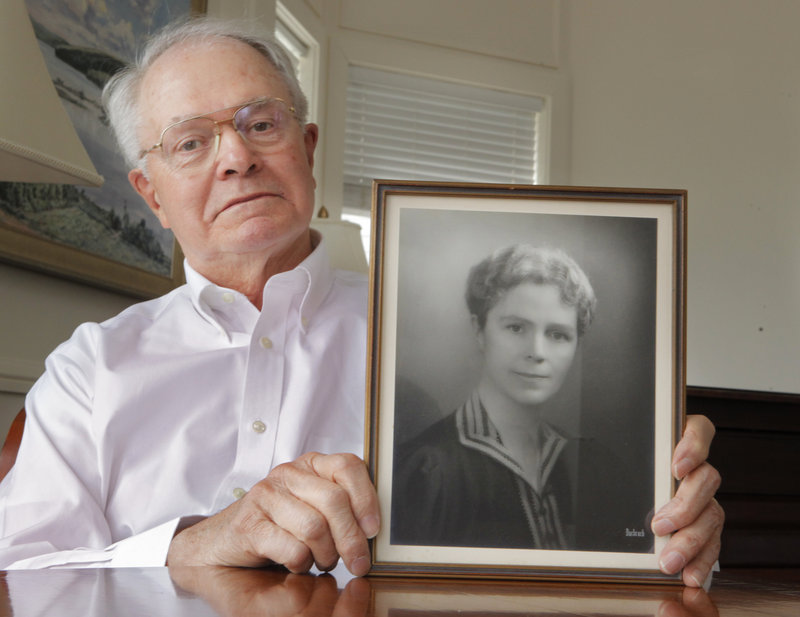Bradford Wellman thinks his mother would be a bit overwhelmed and baffled by all the attention the Titanic is getting 100 years after it sank in the North Atlantic.
After all, she rarely spoke of the night – a century ago next Saturday – when she was nearly one of the more than 1,500 who lost their lives after the ocean liner hit an iceberg on its maiden voyage.
“I don’t know what she’d think of all of this,” said Wellman, who lives at Piper Shores in Scarborough.
Wellman said his mother, Mary Lines Wellman, like many survivors, didn’t dwell on the tragedy.
The 80-year-old Wellman remembers when he was a child and his mother explained the significance of the flashlight that was kept in a cabinet in the living room. It was her light, Wellman said, and she used it in the lifeboat after the crew failed to provide one in the hurried attempt to get the lifeboats away from the sinking Titanic.
But after that, she almost never spoke of the Titanic – at least not until the bestseller “A Night to Remember,” by Walter Lord, came out in 1955. The book failed to list her as a survivor, Wellman said, so his mother fired off a letter to the publisher, making sure it was corrected for subsequent editions.
At the time of the sinking, Wellman’s mother was 16; she and her mother lived in Paris and were traveling to her brother’s graduation from Dartmouth College.
Wellman said his mother was never clear on how she learned that the Titanic had hit an iceberg and was sinking.
She said a steward alerted the Lineses, telling them, “This is real, you need to get on deck and you need to take your life jacket.”
But at other times, she said they were awakened by Percival and Richard White, a father and son from Brunswick who had struck up a friendship with the Lineses during the voyage.
Richard White had graduated early from Bowdoin College in December. While waiting to attend the graduation ceremony with the rest of his class, White was taken on a trip to Europe by his father. Impressed by the Olympic – the Titanic’s sister ship – on the trip to Europe, Percival White decided to buy tickets on the Titanic for the return trip.
The two perished when the Titanic went down. Richard White’s body was recovered, but his father’s body was never found.
Wellman said his mother talked of getting in the lifeboat and it being lowered into the water, even though the lifeboat wasn’t full. That apparently wasn’t unusual, at least until it became clear that the gash ripped open by the iceberg was going to take down the ship.
“A lot of people were ignoring it,” Wellman said, because “this was a ship that couldn’t sink.”
But the Lineses got into the lifeboat and crew members rowed it away from the sinking ship.
“She remembered that the most frightening or heart-rending (time) was people crying for help and the sailors refused to take the boat back because they were afraid of it being swamped by people trying to climb on.”
She also recalled being well cared for by both the passengers and crew of the Carpathia, which picked up 705 survivors of the Titanic and took them to New York.
Wellman, who came to Maine in 1957 to help in his wife’s family business of forestry management, said he’s attended some displays of Titanic memorabilia over the years, including one in London of items recovered near the wreck. He said the personal items struck him most deeply, especially a ring that was the last item on display.
“I was fine until I saw that,” he said. “It could have been hers.”
Wellman said the family’s only Titanic mementos are the flashlight, a ticket stub for a deck chair reservation and a shipping list of clothing that Wellman’s grandfather sent to New York for his wife and daughter after the sinking.
Wellman said he’s fine with explorers collecting items from around the wreck, but said they shouldn’t go inside.
“It’s a grave, we ought to leave it alone,” he said.
Wellman thinks much of the interest in the Titanic today is due to the blockbuster 1997 movie, centered on a fictionalized romance between a wealthy socialite and a poor would-be immigrant. Wellman said he hasn’t seen the movie.
But he said he knows why the sinking was such big news in 1912, beyond the fact that it took the lives of some of the world’s most wealthy and powerful people, including John Jacob Astor, a summer resident of Bar Harbor.
It was a time of huge strides in science and technology, Wellman said.
“Everything was bigger and better and faster,” he said. “And this kind of stopped it, this great machine that didn’t work.”
Wellman said he thinks there are parallels today, with such huge advances in technology in the last few decades and many wondering whether it has really improved our lives.
Staff Writer Edward D. Murphy can be contacted at 791-6465 or at:
emurphy@pressherald.com
Send questions/comments to the editors.





Success. Please wait for the page to reload. If the page does not reload within 5 seconds, please refresh the page.
Enter your email and password to access comments.
Hi, to comment on stories you must . This profile is in addition to your subscription and website login.
Already have a commenting profile? .
Invalid username/password.
Please check your email to confirm and complete your registration.
Only subscribers are eligible to post comments. Please subscribe or login first for digital access. Here’s why.
Use the form below to reset your password. When you've submitted your account email, we will send an email with a reset code.